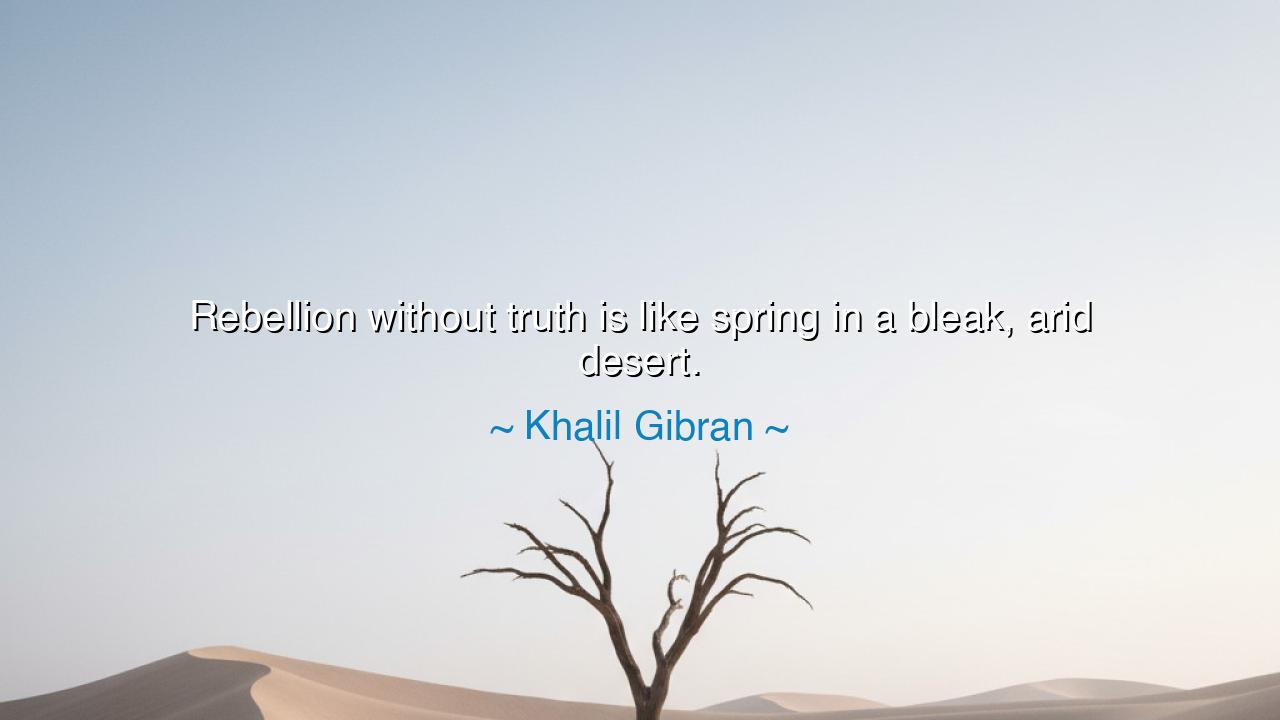
Rebellion without truth is like spring in a bleak, arid desert.






The poet of Lebanon, Khalil Gibran, whose words move like rivers through the deserts of the soul, once proclaimed: “Rebellion without truth is like spring in a bleak, arid desert.” This is not merely poetry but prophecy. For Gibran, who saw nations torn by war and hearts torn by longing, knew that rebellion in itself is not enough. Without truth at its root, rebellion is barren, like rainless springtime in lifeless sand—an image of promise that cannot bear fruit.
To understand this, we must know that rebellion is the cry of the human spirit against oppression, falsehood, or decay. It is the uprising of the heart that refuses chains. But rebellion is only a tool, a flame. Without the guiding presence of truth, it becomes a fire that consumes rather than nourishes. The desert blooms only when water flows; likewise, rebellion yields life only when it springs from truth. Otherwise, it is noise without music, movement without purpose, a spring that promises life but delivers only dust.
History gives us its lessons. Consider the French Revolution. The people rose against tyranny, their voices fierce and their demands just. But when truth was lost to vengeance, the guillotine ruled, and liberty was drowned in rivers of blood. Here was rebellion without truth—a spring in the desert, bright for a moment, but producing no enduring fruit. Contrast this with India’s independence movement, led by Gandhi. His rebellion was not fueled by hatred but by the truth of nonviolence, by the conviction that justice must never betray compassion. From this truth, a nation was born without drowning itself in the bitterness of endless war.
So too in the life of individuals. A youth may rebel against parents, against society, against the ways of tradition. But if his rebellion is without truth, it is empty defiance, leading only to chaos in his heart. Yet if his rebellion is guided by truth—by the desire for honesty, freedom, or integrity—then it is not mere rejection but transformation. The desert of his life blooms; rebellion becomes the fertile beginning of wisdom.
Gibran’s metaphor of spring in a desert is powerful because spring is meant to bring renewal, hope, and life. But if spring comes without water, if it comes without fertility, then its beauty is hollow, its promise false. So too is the rebellion that does not carry truth. It may look fierce, it may sound noble, but it cannot endure. It withers, leaving the land no richer than before. Truth is the water that makes rebellion bloom into justice.
The lesson for us is clear: never rebel merely for the sake of rebellion. To destroy is easy; to build is sacred. Ask yourself: what truth lies at the root of my rebellion? Am I tearing down out of anger, or am I planting seeds for what is just, good, and eternal? For without truth, rebellion is vanity; with truth, rebellion is creation.
Practical wisdom must follow. When you feel the fire of rebellion in your heart, pause to seek truth. Do not rush into rage; search for the foundation upon which you stand. Speak and act not from mere defiance, but from clarity. Align your rebellion with truth—whether that truth is justice, compassion, or freedom—and your actions will not be barren, but fruitful. In this way, your uprising will not be a spring in a desert, but a spring in a fertile valley, bringing harvests for generations yet unborn.
Thus remember Gibran’s teaching: rebellion without truth is lifeless, but rebellion with truth is the seed of renewal. Be not content to rage against falsehood; instead, let truth be the water that turns your fire into light, your defiance into justice, your rebellion into the rebirth of the world.






HPHa Phuong
Khalil Gibran’s statement is a stark reminder of how rebellion without direction or truth can lead to desolation. It raises the question of whether any revolution or social change can thrive without a core belief or truth guiding it. How often do we see movements that are emotionally charged but lack a unifying, truth-based cause? Can true rebellion only emerge when it’s rooted in something greater than just opposition?
UGUser Google
Gibran’s metaphor of rebellion without truth being like spring in a desert is powerful. It speaks to how hollow actions can be when they lack purpose. Can rebellion ever truly succeed if it’s not built on a foundation of truth? Or is truth subjective, and rebellion simply the expression of an opposing force? I wonder if we can ever truly separate the two, or if they’re inherently intertwined.
HNNguyen Thi Huynh Nhu
This quote by Gibran made me think about how rebellion can sometimes be misguided. Without truth, it seems to lack direction, much like spring in a desert—appearing briefly, but not lasting. Can rebellion, then, ever truly bring about meaningful change without a foundation of truth? Is it possible that many social movements falter not because of their goals, but because they lose sight of the underlying truths they aim to expose?
TLTrang Linh
Khalil Gibran’s quote about rebellion without truth really strikes a chord. It suggests that rebellion, without a guiding principle of truth, is ultimately meaningless, like trying to grow life in a barren desert. Does this mean that all forms of protest or resistance must be rooted in a deeper, fundamental truth? How often do we see movements or causes that may start as rebellion but lack a solid foundation of truth, leading to their eventual failure?